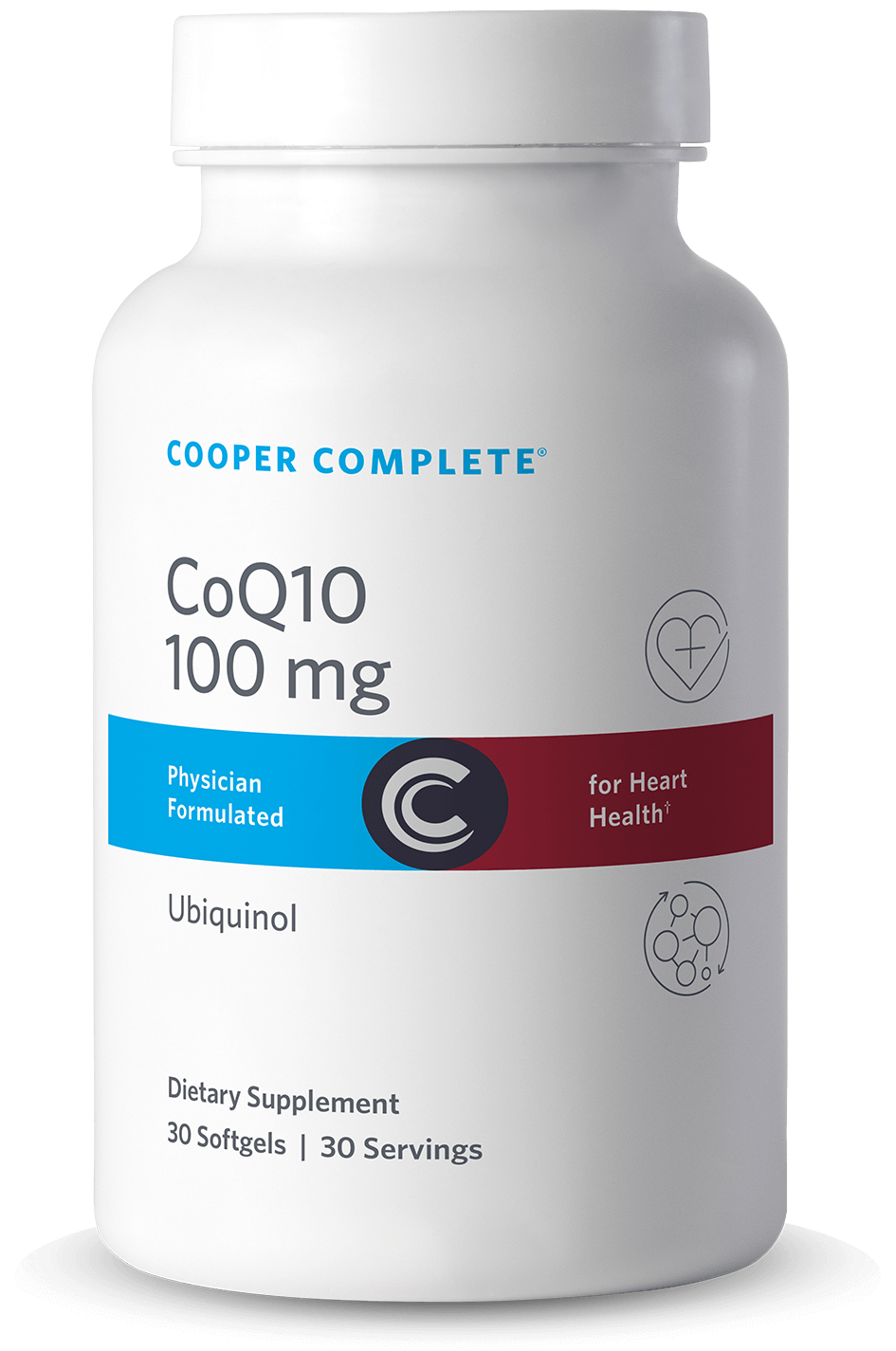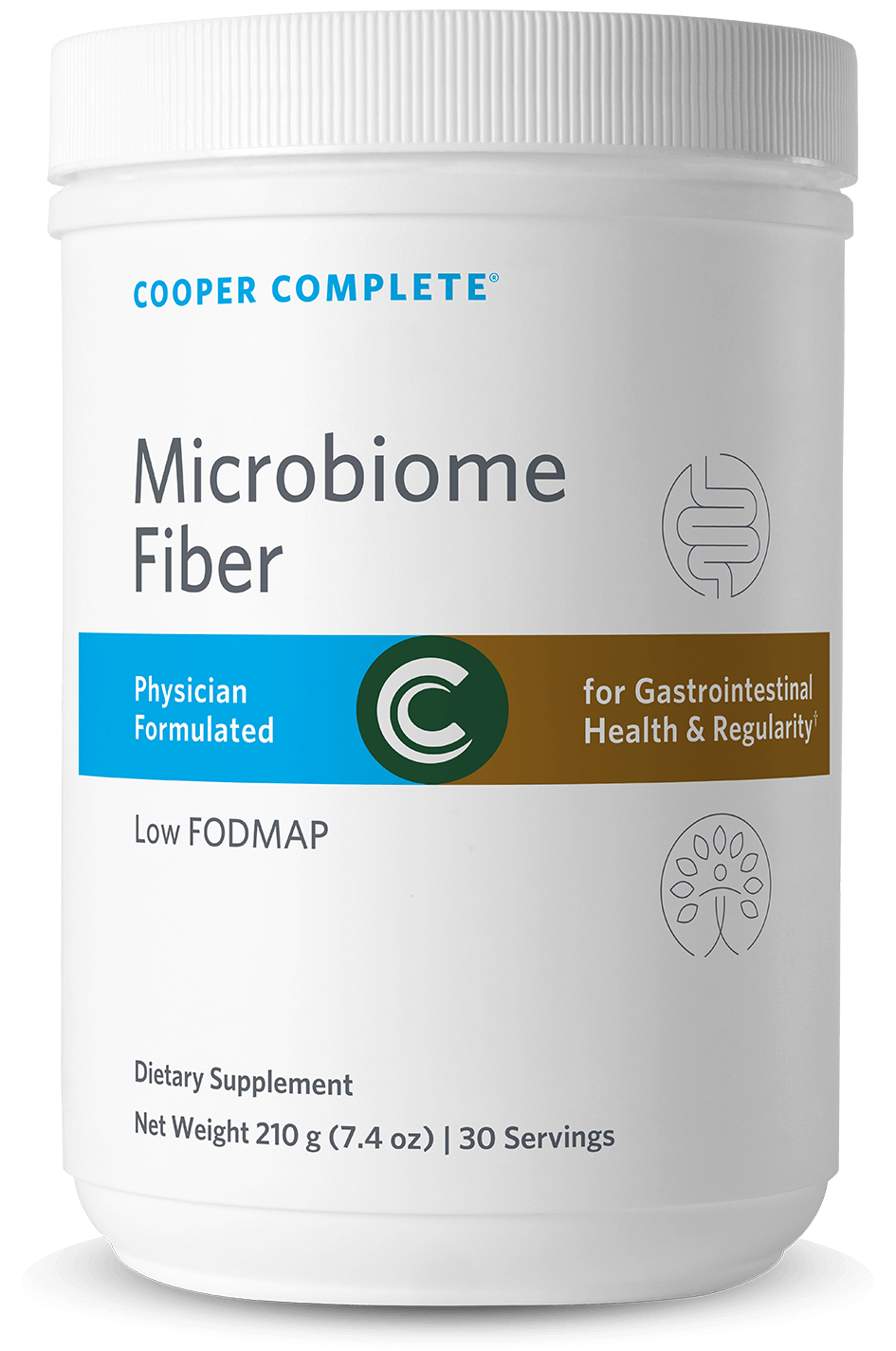The Best Supplements for Heart Health

Heart disease is the leading cause of death in adults in the United States, surpassing cancer, respiratory disease, stroke, and accidents. The good news? Healthy daily habits, like eating a balanced diet, staying physically active, and making informed supplement choices, can help reduce your cardiovascular risk†.
Below, we explore the best supplements for heart health†, from omega-3s to CoQ10, along with key insights from Cooper Clinic physicians.
Table of Contents
- Lifestyle First: Nutrition and Exercise for Heart Health
- Omega-3 Fatty Acids: A Foundational Heart Health Supplement
- CoQ10: Support for Statin Users and Cellular Energy
- Inflammation and the Heart: The Role of Nutrition and Supplements
- Berberine: A Plant Compound for LDL Management
- Fiber: A Simple Addition for Cholesterol and Heart Support
- Magnesium: Supporting Blood Pressure and Heart Function
- Final Thoughts: Choosing the Best Supplements for Heart Health
Lifestyle First: Nutrition and Exercise for Heart Health
Before turning to supplements, it’s essential to establish a solid foundation through a balanced diet and regular exercise.
- For lowering cholesterol, Cooper Clinic Registered Dietitian Nutritionists recommend:
- Eliminate or limit saturated fats, trans fats, and dietary cholesterol.
- Focus on fiber-rich foods, whole grains, fruit, vegetables, legumes and beans.
- To support healthy blood pressure, the DASH eating plan (Dietary Approaches to Stop Hypertension) emphasizes:
- Increase your consumption of fruits, vegetables, and low-fat dairy products.
- Reduce your consumption of processed foods and sodium (salt).
- Regular physical activity helps improve:
- Cholesterol and blood pressure levels
- Blood sugar metabolism
- Inflammation markers
- Vascular function and heart resilience
For individuals at high risk of developing a heart attack or stroke, prescription therapies such as statin medication may also be needed. Supplements may offer additional support for those looking to complement lifestyle and medication plans†.
One of Dr. Kenneth H. Cooper’s 8 Steps to Get Cooperized™ is “Take the Right Supplements for You.” Cooper Clinic Cardiologists John S. Ho, MD and Nina B. Radford, MD, discuss supplements that may enhance heart health and reduce cardiovascular risk factors†.

Advanced Omega-3 Supplement
Advanced Omega 3 Supplement contains 720 mg EPA, 480 mg DHA, and 200 mg other omega-3 fatty acids in each serving of two lemon-flavored softgels. Omega 3 supplementation supports heart health, cognition, immune, and inflammatory health without any fishy aftertaste.†
$22.98 Add to cartOmega-3 Fatty Acids: A Foundational Heart Health Supplement†
Why Omega-3s Matter
Fatty fish like salmon, cod, mackerel, sardines and canned light tuna are rich in EPA and DHA, two long-chain omega-3s known to support heart health†.
The American Heart Association recommends at least two servings of fatty fish each week, yet most Americans fall short, making supplementation a practical option†.
Omega-3 Benefits for Heart Health†
- Blood pressure: Clinical reviews suggest omega-3s may modestly lower blood pressure, especially when paired with healthy habits, such as increased exercise, a healthy diet and reduced alcohol consumption†. According to the Centers for Disease Control and Prevention, nearly half of U.S. adults—nearly 120 million—have hypertension, but only about 25 percent of those adults have their hypertension under control. Hypertension is a risk factor for heart disease, stroke and kidney disease.
- Heart attack risk: The VITAL study followed 25,871 adults aged 50 and older to determine the impact of supplementation with 50 mcg (2,000 IU) of vitamin D and 1 gram (1,000 milligrams) of fish oil per day and found almost a 20 percent reduced risk of major cardiovascular events among those with low fish intake who supplemented with omega-3’s†. (Read an in-depth analysis of the VITAL study results here.)
- Triglyceride reduction: Omega-3s are well-studied for their ability to reduce high triglyceride levels, a key cardiovascular risk factor†. “The data on omega-3 as it relates to decreasing triglycerides is very strong†,” says Dr. Ho. “I take Cooper Complete Advanced Omega-3 because I have high triglycerides myself†. I also have calcification, and omega-3s are one of the nutrients I use to support my heart health†.” With 1400 mg of EPA and DHA in each two-softgel serving, “Cooper Complete Advanced Omega-3 has among the highest levels of EPA and DHA†,” explains Dr. Ho. “That’s why I recommend it to my patients.”
(For those who may experience swallowing difficulties, there’s also Advanced Omega-3 Liquid, which contains 2150 mg of EPA and DHA in each level teaspoon (5 mL). And a vegan, plant-based omega-3 for individuals who do not consume seafood.)

100 mg CoQ10 Ubiquinol Supplement
KanekaQH®, the reduced form of coenzyme CoQ-10, provides advanced antioxidant support and promotes cellular energy and optimal heart and immune function.†
$37.98 Add to cartCoQ10: Support for Statin Users and Cellular Energy†
Along with diet modifications and increased exercise, doctors often prescribe statin medications to help lower LDL (bad) cholesterol. High-potency statin drugs can reduce LDL cholesterol by more than 50 percent. Statins lower cholesterol but may also reduce CoQ10 levels, a compound important for mitochondrial energy production†.
Potential Benefits of CoQ10 Supplementation†:
- May help replenish CoQ10 levels lowered by statins†
- Could ease muscle-related side effects of statin therapy†
- Supports overall energy metabolism in heart and muscle cells†
“If my patient complains about statin side effects, I always recommend CoQ10†,” says Dr. Ho. “I start with 100 mg of CoQ10. If the statin begins to work, I go up to 150 mg, possibly even 200 mg.” Approximately 30-40 percent of his patients experience relief once they start taking CoQ10†. Regardless of the side effects, Dr. Ho strongly reinforces to his patients who have been prescribed statins that they must stay on the medication unless directed by their cardiologist.
Cooper Complete CoQ10 is in the ubiquinol form, which is the active antioxidant form that some research suggests is better absorbed by the body†. Cooper Complete CoQ10 is available in 100 mg and 50 mg options. (Cooper Complete Original Comprehensive Multivitamin also contains 100 mg coenzyme Q10.)
Inflammation and the Heart: The Role of Nutrition and Supplements
Chronic inflammation plays a key role in the development of atherosclerosis (hardening of the arteries) and cardiovascular disease. The clinical observation that patients with rheumatoid arthritis or inflammatory bowel disease have an increased risk of developing cardiovascular disease highlights the role of chronic inflammation in the progression of atherosclerosis (hardening of the arteries). Decades of both clinical and basic science research have demonstrated that both clinical (symptomatic) and subclinical (asymptomatic) inflammation play a critical role in the development and progression of cardiovascular disease. Common inflammation triggers include:
- Acute viral infections
- Chronic lung infections
- Diabetes
- Obesity
- Poor oral health
- Sedentary lifestyle
- Smoking
- Stress – chronic and acute
- Toxins in the gut
Nutritional Strategies to Reduce Inflammation:
- Reduce: red and processed meats, refined carbohydrates and added sugar
- Increase: fruits, green leafy and dark yellow vegetables, whole grains, and fatty fish
Low-grade inflammation can be present without producing symptoms of an illness (like rheumatoid arthritis) but can be detected by measuring inflammatory biomarkers in the blood. The blood test most commonly used in clinical settings to detect the presence of low-grade inflammation is high-sensitivity C-reactive protein (hsCRP). Some studies have shown that high levels of hsCRP may be just as significant, if not more so, as high levels of LDL (bad) cholesterol in the development of atherosclerosis. A study of nearly 18,000 men and women found a link between higher C-reactive protein (hsCRP) levels and diets high in sugar and low in fiber, polyunsaturated fats, and antioxidants.
Cooper Complete Multivitamin and CRP†:
A clinical trial published in the American Journal of Medicine found that Cooper Complete Original Iron Free reduced CRP levels by 32 percent†. Key vitamins associated with this reduction included:
- Vitamins B6 (10 mg)
- Vitamin C (500 mg)
Berberine: A Plant Compound for LDL Management†
According to Cooper Clinic Cardiologist Nina Radford, MD, there is a bounty of epidemiologic data that describes a correlation between elevated LDL (bad) cholesterol and increased risk of cardiovascular events, such as heart attack and stroke. Furthermore, a large body of clinical trial evidence demonstrates a strong association between a reduction in LDL cholesterol and a lowered risk of cardiovascular events in high-risk individuals without a history of heart disease (primary prevention) and in all individuals with a history of prior cardiovascular disease events (secondary prevention).
The mainstay non-drug treatment of high LDL cholesterol is dietary modification with practical approaches for decreasing LDL cholesterol, including:
- Eliminate trans fats, which are commonly found in packaged, commercially baked goods.
- Substitute monounsaturated fats, such as canola oil, olive oil, and avocado oil, for saturated fats, including fatty meats, cream, butter, cheese, palm oil, and coconut oil.
- Eat more soluble fiber, which can be found in oats, peas, beans, apples, citrus fruits, carrots, barley, pectin and wheat dextrin.
While there is no clinical trial evidence that shows supplements that lower LDL also lower the risk of cardiovascular disease†, many patients who do not want to use prescription drugs to manage LDL cholesterol turn to supplements for this purpose (red yeast rice, fiber, plant stanols and sterols)†. A relative newcomer to this group of supplements is berberine, an alkaloid found in the root, fruit or bark of a number of plants, including goldenseal, Oregon grape, barberry and tree turmeric†.
In a meta-analysis of six trials, 229 patients with high cholesterol who took between 900-1500 mg of berberine per day saw 20-50 mg/dL reductions in LDL cholesterol levels (about a 25 percent reduction from baseline)†.
Cooper Complete offers a Berberine Complex for balancing metabolic risk factors associated with cardiovascular diseases† and supporting glucose metabolism†. This custom formulation contains alpha-lipoic acid to support proper insulin function† and vitamin C for additional antioxidant protection†.
Berberine may lower blood sugar† or blood pressure†; therefore, if you take medication for diabetes or hypertension, carefully monitor your blood sugar and blood pressure while taking this supplement†. Berberine is unsafe to take if you are pregnant or breastfeeding. While berberine has been shown to reduce LDL cholesterol†, it is not a substitute for statins. There is little evidence and long-term safety data supporting improved clinical outcomes from berberine supplementation.

Microbiome Fiber Supplement
Cooper Complete® Daily Prebiotic Microbiome Fiber supplement contains 6 grams of tasteless and gritless soluble fiber and is low FODMAP to support gastrointestinal health and regularity.†
$30.48 Add to cartFiber: A Simple Addition for Cholesterol and Heart Support†
Soluble fiber binds to cholesterol in the digestive tract, helping to remove it from the body†.
Health Benefits of Fiber†:
- May reduce serum total cholesterol by about 20 mg/dL†
- Supports healthy blood pressure† – A small study found that guar gum decreased blood pressure in moderately overweight men with mild hypertension†, resulting in a nine percent decrease in both systolic and diastolic readings after two weeks of consuming 7 grams of guar gum three times daily
- May lower the risk of coronary events† – Studies, such as the Nurses’ Health Study, have found that women with the highest fiber intake (averaging 22.9 grams per day) had a 50 percent lower relative risk of a major coronary event compared to women with the lowest fiber intake (11.5 grams per day)†
Cooper Complete Microbiome Fiber uses Sunfiber guar gum, which also acts as a prebiotic, feeding beneficial gut bacteria that may help reduce inflammation†.
Magnesium: Supporting Blood Pressure and Heart Function†
Magnesium is an essential nutrient for:
- Cellular energy production†
- Cardiac metabolism and function†
- Vascular tone†
Inadequate magnesium intake has been associated with less favorable outcomes related to blood pressure, cholesterol, and metabolic health†. Many people, especially older adults and those taking common medications, including diuretics (commonly used to manage hypertension) and proton pump inhibitors (used to manage heartburn and reflux), may not meet recommended magnesium intake levels.
In general, approximately 50 percent of Americans consume less than the Estimated Average Requirement (EAR) for magnesium, and some age groups consume substantially less.
Consider talking with your physician or health care provider if you suspect you’re not meeting daily requirements through your diet†.
Final Thoughts: Choosing the Best Supplements for Heart Health
While diet and exercise are the cornerstones of heart health, supplements can offer valuable support for blood pressure, cholesterol, inflammation, and nutrient gaps†. Always consult with your physician or health care provider before starting any new supplement, especially if you’re managing current health conditions and taking prescription medications. Together, you can determine which options are the best supplements for heart health based on your individual needs†.
